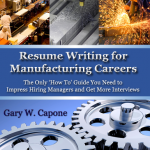We’ve all heard the unemployment rate, and that it will get worse before we start to see some improvement. On a national basis, this is a serious problem. For an individual job seeker, the concern is more personal – landing a single job. No matter how high or low unemployment is, the primary (or only concern) is whether you can land a job for yourself. Despite this, there is some interesting and useful information in the jobs data.
We’ve all heard the unemployment rate, and that it will get worse before we start to see some improvement. On a national basis, this is a serious problem. For an individual job seeker, the concern is more personal – landing a single job. No matter how high or low unemployment is, the primary (or only concern) is whether you can land a job for yourself. Despite this, there is some interesting and useful information in the jobs data.
Unemployment Claims
Yesterday, it was announced that 505,000 people filed new unemployment claims last week. This is just over a hundred thousand people per day. It’s a huge number. Fortunately, the number does have some positives. First, it’s 100k lower than were we were at the start of the year. Second, we’re approaching parity with jobs created. The number I keep hearing is 400,000. At that level, the number of people losing jobs each week will roughly equal the number landing jobs each week.
The 400k figure has some significant implications. First, it means 400k people are getting hired every week. That’s 80,000 people every day. If you are worried about the economy as a whole, that doesn’t mean much, but it you are a job seeker, it means a lot. Every day you search for a job, 80k people are going to be successful. Searching for a job is far from a hopeless activity.
Job Postings
Looking at Indeed’s job posting trends, in October, there were just over 1.8 million job postings. That’s a lot of jobs. Divide that number by 22 (the number of work days in October) and you 81,000 – approximately the number of people landing jobs each day. So, the job postings are also getting filled. Companies are hiring people, even if it is at a lower rate than a couple of years ago.
The competition for these jobs is high. There’s no arguing that. Right now, we have approximately 15 million people unemployed. That’s roughly 8 people for every job opening last month. Of those 15 million, roughly 1.8 million should land jobs in November, while 13.2 million won’t. On a national basis, this is a major problem. For your job search, there are 1.8 million positions out there and you only need one.
Geography
All locations are not equal. Indeed.com has a great trend page showing the number of job seekers compared to the number of open jobs for different metro areas. It’s no surprised Detroit is at the bottom of the list, and with all the government jobs, Washington, DC is on top. (Check out the data: http://www.indeed.com/jobtrends/unemployment)
If you’re in a city with a low ratio, you should be in good shape. If you are not, your prospects are still not hopeless. You just have more competition you will need to beat out.
Bottom Line
Some people will look at the stats above and get energized (80k people will be hired today) and others will despair (13.2 million people won’t get a job this month). If you want to be in the 80k getting hired every day, you need to work at it and maintain a positive, energetic attitude. If you don’t, you are much more likely to be in the 13.2 million. Discouraged job seekers are making up a larger and larger percentage of the population and their prospects are very low. They are much less likely to actively network, customize their resume and cover letter, prepare thoroughly for every interview and do all the little things you need to do to be successful. Staying positive during your job search can be as important a factor in your success as all the skills and experiences you possess.

